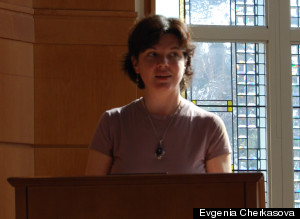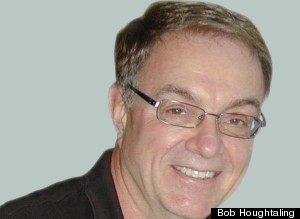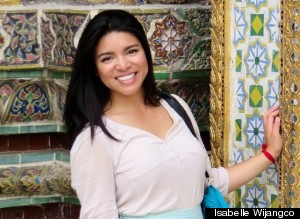
Twenty years ago, Evgenia Cherkasova and Elena Kornilov were doctoral students in their mid-20s, living in the same housing complex at Penn State University. As they pursued their degrees -- Cherkasova in philosophy, Kornilov in physics -- both started families, and to take a break from studying they found themselves meeting for wine or tea, or watching their young children on the playground. As their friendship deepened, their conversations often veered into the Big Questions on their minds: How could they live a "good life" with purpose, happiness and success? What did those words mean?
After graduation, Cherkasova and Kornilov went their separate ways, keeping in touch via letters and weekly phone calls, sharing the details of every aspect of their lives – their kids’ first days of school, their academic research, their relationship hurdles.
On March 4 of this year – Kornilov’s 48th birthday -- her doctor called to tell her she had breast cancer. Even as she hid the diagnosis from other friends and some family members, Kornilov confided in Cherkasova, and the two went over her treatment options. Some, like chemotherapy, were physically intrusive, but would greatly increase the chance of remission. Others, like hormonal drugs, were easier to handle, but came with a higher risk of a tumor returning.
Suddenly, the conversations and questions that guided their friendship over the years took on a new meaning. They weren’t just idle speculations; they were real, urgent, full of consequences, perhaps now even a matter of life and death.
“We started talking about how you deal with these situations, especially when it’s a patient with a potentially terminal disease,” recalled Cherkasova, now a philosophy professor at Suffolk University in Boston. “She told me, ‘it’s a question of the quality of life versus length of life. You have to decide: If you want to prolong your life, then what do you do it for? What am I doing in life at this point? What’s happiness?”
***
This fall, as the latest crop of freshmen arrives on university campuses across the country, many students will find themselves debating similar questions, and not only in early-morning 101 courses. In dining halls and dorm rooms, as they come together with people of vastly different backgrounds and perspectives, they’ll continue the typical college traditions of late nights, long conversations and self-discovery. And when they graduate, they will face a challenge much steeper than any college exam or doctoral dissertation -- carrying that spirit of inquiry with them into the real world.
Statistical and anecdotal evidence suggests this is easier said than done. According to the Bureau of Labor Statistics, which takes an annual measure of how Americans use their time, the average person spends about 45 minutes daily “socializing and communicating.” Watching TV, meanwhile, accounts for nearly three hours of the average American’s day. And today’s laptop-scattered coffee shops don't seem to foster environments of conversation and debate, like the salons of France, often credited with incubating philosophical discussions that ushered in the Age of Reason, or the cafe culture, a backdrop for the Existentialist musings of Jean-Paul Sartre and his contemporaries.
Of course, it’s much easier to measure TV-watching than America's intellectual engagement and introspection. But for some time, scholars and observers have been documenting, often with alarm, a shift from a society structured around social gatherings to a culture of technology-driven individualism -- or, depending on your point of view, isolation. Writing more than a decade ago in Bowling Alone, Harvard public policy professor Robert D. Putnam documented the erosion of Americans’ participation in community clubs -- like bowling leagues and civic organizations -- and the disengagement from society and the self that it fostered. More recently in Alone Together, Massachusetts Institute of Technology clinical psychologist Sherry Turkle, who studies the impact of technology on social relations, examined how hyperconnected-ness has created relationships where we have the “illusion of companionship” without the “demands of friendship.”
In other words, we are moving toward a way of life that discourages the kinds of conversations that defined and sustained Cherkasova and Kornilov’s friendship.

"We have stripped away so many of the conditions that make conversations like these flourish. And the condition that makes it flourish, in many cases, is the uninterrupted full attention to each other," said Turkle, who has spent the three years interviewing dozens of people from various walks of life about what they talk about with friends and how they do it for an upcoming book called Reclaiming Conversation. "These conversations are what college students are missing, they're what people at work are missing, they're what we're all missing.”
In the midst of this shift, the American university system remains an oasis of sorts, a place where the Big Questions are freely and fiercely debated -- in no small part because many students are not yet dealing with the pressures of work and family. But there’s a shift on American campuses, too. Just seven percent of graduates major in the humanities, like philosophy and literature, while majors in largely career-oriented fields have increased as more Americans pursue higher education. A half-century ago, twice as many students walked across commencement stages with humanities degrees.
New York Times columnist David Brooks, who has written and spoken extensively about the decline of the “humanist vocation,” began teaching a course at Yale University last spring about the history of character building. He said he believes there’s a shortage of people publicly asking the cosmic questions.
“People are hungry for a certain side of writing about these issues, but we no longer have that kind of group of writers widely discussing how you measure a life," said Brooks.
On occasion, an awe-inspiring commencement speech -- like David Foster Wallace's "This is Water," which was given at Kenyon College in 2005 and became a book after his death -- makes its way into pop culture. But Brooks believes we need much more. "Back in the 1950s, you had Joshua Heschel and Reinhold Niebuhr; they were writing books devoted entirely to these issues," he said.
Heschel, a rabbi who stood on the front lines of the Selma-to-Montgomery marches with Martin Luther King Jr., also was known for penning provocative theological works, like Man is Not Alone and God in Search of Man. The works of Niebuhr, a Christian theologian and professor at Union Theological Seminary, include Moral Man and Immoral Society and The Nature and Destiny of Man.
“For anyone who goes to church, these are the questions they are essentially grappling with via their faith,” said Brooks. Indeed, a measurable drop in religious affiliation and attendance at houses of worship may be a factor in the decline of a culture of inquiry and conversation. According to the Pew Research Center, 1 in 5 Americans identifies with no religion, including those who are atheist, agnostic or “spiritual but not religious.”
But the Big Questions aren't just for the faithful, and there are glimmers of hope for those who long for the days when it was easy to find souls loudly searching for what the Greeks described as eudaimonia, or the “human flourishing,” considered central to a person and society’s development.
On Meetup.com, a website where people organize get-togethers around mutual interests in homes, restaurants or cafes, hundreds of groups focused on philosophy, spirituality and religion have launched in recent years. TED, the conference series with the slogan “ideas worth spreading,” has an independent affiliate that hosts weekly salons in a Manhattan apartment where attendees watch taped talks then discuss them (in August, the theme of each meeting was “courage”). And from suburban Columbus, Ohio, to Seattle, individuals and nonprofits have launched grassroots efforts aimed at getting Americans to talk about death and what they desire out of life; events include Death Cafes -- monthly coffee shop-centered discussions on dying that can now be found in nearly every major American city -- and Death Over Dinner, a coordinated series of meals that took place in hundreds of homes last month.
The Adult Philosophy Club of East Greenwich, R.I., was launched just over three years ago by a drug addiction counselor who recognized what he called “existential crises” among his clients. Today, the group is open to the whole town.

For 90 minutes each Tuesday in a community room at a police station, Bob Houghtaling, a 59-year-old counselor who studied philosophy as an undergraduate at Rhode Island College, leads a roundtable of a dozen citizens ranging from teenagers to retirees. Sometimes, they’re discussing a book, like Eichmann in Jerusalem, the examination of the trial of Nazi war criminal Adolf Eichmann in which political philosopher Hannah Arendt coined the term “the banality of evil.” Or they’re going to museums and films, like the Tomaquag Indian Memorial Museum in Rhode Island and a showing of the feature film "Lincoln."
“What constitutes morality? Are we moral? Is what’s right something natural or is it something that we’re taught?” Houghtaling said, recounting some of the club’s recurring themes. “People come in with strong convictions and religious views. It can get heated.”
Oftentimes, the conversation spins off of the news. With international controversy over revelations about the National Security Agency’s extensive spying programs and amid increased tensions over the Obama administration’s threat to launch strikes against Syria, the discussion frequently turns to the role of the state. “What obligation does the state have? In a critical situation like a war, can the government suspend natural rights?” said Houghtaling. “Where’s the line?”
As Houghtaling sees it, these are questions that can all too easily be swallowed by the activities and stresses of everyday life.
“We go through the perfunctory things so much, putting on our suits and ties, and putting on our titles, that we don’t get to talk about humanity and life. It’s cathartic when you get to do it,” he said. “It’s tough to sustain yourself unless there are ‘whys’ and purposes.”
Yet, there are plenty of reasons for putting off these questions. With high unemployment and economists predicting years of recovery from the recession ahead, jobs and money have a way of taking precedence over any talk of higher purpose. When Gallup researchers asked an international group of respondents a few years ago to describe their “best possible future," the responses leaned heavily toward “wealth” and “good health.” It was harder, on the other hand, for people to describe what they considered good relationships and a sense of community, and how important they were.
***
Given the considerable evidence and widespread perception that we are drifting away from the Big Questions, more universities have committed to sparking conversations. Many classrooms and campus greens are being turned into experimental zones where students and faculty can explore what Greek philosophers called the quest for ataraxia, or “tranquility,” in life.
Recognizing a yearning for “intellectual community,” the National Endowment for the Humanities has given $2.2 million in grants since 2009 to fund college and university courses that tackle the “enduring questions.” Cherkasova will teach one next year at Suffolk University in Boston called, What is the Meaning of Life (its syllabus includes Ecclesiastes and Siddhartha, Hermann Hesse’s philosophical novel about a young Brahmin’s journey of self-discovery during the age of Gautama Buddha). Among dozens of courses that the NEH has funded are, What Is The Meaning of Happiness, taught at New Mexico State University, Las Cruces; an upper-level class at the College of St. Benedict in St. Joseph, Minn., titled, What am I?, and at Ursinus College in Collegeville, Penn., What is Love?
To advocates, these courses are more than mere intellectual exercises and bull sessions. They pose questions intimately connected to the core of everyday life.
“When you are dealing with college students, mostly what you are doing is trying to plant seeds so they are familiar with different world vocabularies,” said Brooks, whose own course was not taught with a grant but is similar in some ways to the NEH programs. “You want it to be so that when they get older and encounter challenges, they know what to do, and have books and ways of thinking to help them tackle problems.”
The West Conshohocken, Penn.-based John Templeton Foundation, best known for its annual Templeton Prize, has spent tens of millions funding largely academic endeavors looking into the "basic forces, concepts, and realities" of the universe and our place in it. They range from the esoteric, like a $5 million project to research immortality at the University of California, Riverside, to projects aimed at a wider audience, like Big Questions Online, a news site updated weekly with essays by academics and spiritual thinkers.
At Brown University, the New York-based Recanati-Kaplan Foundation began last year to fund a cross-departmental, interdisciplinary lecture and conference series on Ethical Inquiry. Its goal: to use Greek philosophies, among others, as a base to inspire students, faculty and the Providence community to explore the meaning of a "good life." At the core of its attempt is another big question: How can the wisdom accumulated over the generations be passed down instead of lost in the shuffle of everyday lives?
“One of the things that interests me is whether we can save young people literally decades of wasted time in coming to the conclusion that almost everyone does generation after generation: The things we thought were important in our youth when the world was open to us, when it was our oyster, when the future would bend itself to our will, really are not,” said billionaire natural gas and gold investor Thomas Kaplan, who started Recanati-Kaplan with his wife, Dafna Recanati.
Kaplan’s own interest in philosophy was set off in high school when his mother gave him a copy of Marcus Aurelius' Meditations, a major Stoic text.
“There are certain truisms. No man on his deathbed ever said, 'I wish I spent more time at the office,’” Kaplan said, describing one of the many lessons he hopes to impart through the nascent effort. One of the foundation's launch events in 2012 was a two-day conference on the “Art of Living.” Hundreds of students, faculty and Providence residents listened to philosophers, psychiatrists, experimental psychologists and scholars of other disciplines examine the "good life."
Meanwhile, at Stanford University, there’s Sophomore College, a three-week intensive course series where students meet for several hours every day with the same class and live together on campus. Among its seminars, the Meaning of Life was taught by the university’s dean of religious life, and included field trips to houses of worship and readings of George Bernard Shaw’s Major Barbara and Robert Bolt’s A Man for All Seasons. In another push, the Office of Religious Life hosts “What Matters to Me and Why,” a series of hour-long public discussions with faculty and administrators about “life questions.” Speakers are encouraged to discuss their personal struggles and reasons for pursuing their fields.

The philosophy department chair spearheading the program at Brown, Bernard Reginster, admits the limitations of universities when it comes to changing conversations at the dinner table. The challenge, he said, is to take the questions "first, to students and faculty outside the confines of academic philosophy and second, to a wider public.” How could exploring philosophy, psychology and literature, for example, amplify the life and work of a future investment banker, economist or engineer?
Isabelle Wijangco, who graduated from Stanford last year with a degree in human biology, is among those who took the Meaning of Life seminar in Sophomore College and said the course is part of what spurred her to want to focus on global women's health issues when she attends medical school.
“One of the big questions we grappled with in Meaning of Life was how to live every moment and be fully present while also being forward-looking and planning for our hopes and dreams for ourselves and the world," she said.
Wijangco recalled that a fellow student described a way to strike that balance by repeating a bit of wisdom he heard from his father: ‘Lay each brick reverently. Lay a purposeful brick, but be in the moment of laying that brick. The house will form.’”
She has carried that wisdom with her ever since. “It has helped serve as a metric for me in maintaining intentionality in every action,” she said, “for both present and future.”
This story appears in Issue 66 of our weekly iPad magazine, Huffington, in the iTunes App store, available Friday, Sept. 13.
